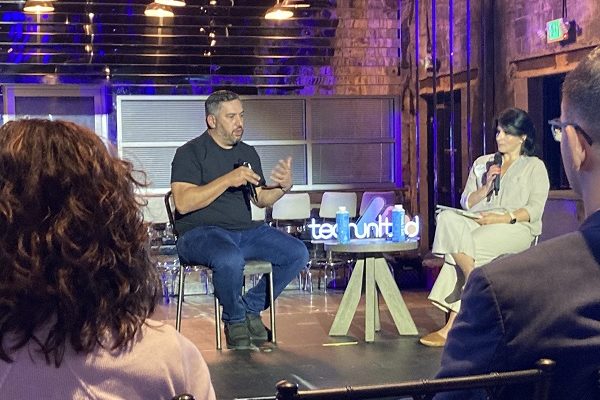Roy LaManna at TechUnited:NJ: How Building a Company in New Jersey Was His Competitive Advantage
Roy LaManna, who recently sold his New Jersey startup Vydia (Holmdel) to $1 billion music startup gamma. (Santa Monica, Calif.), came to the TechUnited:NJ BetterCapital Conference on June 15 and sat down with Denise Lambertson, managing partner at Constellation Capital (New York), to discuss his entrepreneurial journey.
While Vydia’s unique technology was a major reason why gamma. was attracted to Vydia, another important reason was how the company nurtured relationships with artists, LaManna said. Unlike typical recording labels, Vydia worked with artists as though they were partners. “People don’t interact with technology, right? It’s the people behind it.” The value proposition comes “down to the people we hire” that make the relationships happen, LaManna told Lambertson.
Speaking of his new boss at gamma., LaManna said, “Larry [Apple Music’s former global creative director, Larry Jackson] is, in my opinion, one of the most respected music industry guys.” People don’t realize that, at most record labels, the president usually doesn’t have a relationship with the artists, and they come from different worlds. “With someone like Larry, who is running gamma., and is now my boss, they come from similar backgrounds” and see things more eye-to-eye, LaManna said. “There’s a mutual level of respect that I haven’t seen elsewhere.”
LaManna started his business journey when he was just 18, operating as a freelance video director in the music video space. Then he started Trendsetter Media & Marketing in Freehold in 2008, bootstrapping the company during a low point in the economy. Trendsetter is a music video and social media marketing company, and is still located in Freehold.
In 2013 he launched Vydia, which was his first attempt at raising capital and creating something that was primarily a tech company. “It was a whole different animal” from his previous company, involving “board meetings, projections, hiring, accelerated growth and obviously an exit as well.” LaManna recalled that at the beginning he was learning on his own, and even Googling things like “What is a term sheet?” He didn’t know anyone who had raised capital before.
He was in his thirties when he started Vydia, and that gave him some perspective. LaManna recalled his “aha” moment about building his company in New Jersey. He had been traveling to New York to hold meetings with everyone from advisors and investors to prospective team members. “I noticed in my pitches in New York that a lot of people I would meet in New York lived in New Jersey.” He would say to himself, “Well, I woke up in New Jersey, you woke up in New Jersey, we drove two hours into the city to be here. That doesn’t make a lot of sense.” And so he thought about how he could use that understanding to his competitive advantage.
“One of the things I did early on was literally go to LinkedIn and look for someone I wanted to hire,” he said. “And I would always do my own recruiting, especially early on. And I would look for people that did what I wanted at my company, lived in Jersey, and commuted to the city. Then I’d bring them in, and then sell them on the idea that they could work in a company that is very similar [to the company they were then at], but also have more time to go to soccer games or have family time and have a better work–life balance.” He realized that someone who really valued that time would take a 10–20 percent hit on the salary. He then went about building a culture at Vydia by fostering a shared mission and appealing to people who liked to be part of a team and enjoyed working at the company.
LaManna wasn’t always successful in raising money, so early on the company was severely capital constrained. Lambertson pointed out that that in Vydia’s first round LaManna was shooting for $500,000, but only received $325,000. “But look where Roy’s business is now!” she said to the audience, urging them not to give up on their own businesses under tough fundraising market conditions, such as the current climate.
Early funders of Vydia were New Jersey based, including Stephen Socolof, managing partner at Tech Council Ventures (Summit), and Jay Bhatti, a frequent angel investor in local startups. The company also received funding from Newark Venture Partners.


